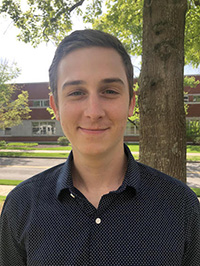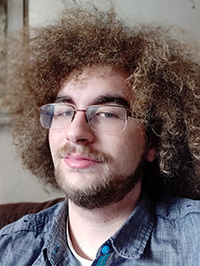CSC News
Two CSC Grad Students Receive Prestigious NSF Graduate Research Fellowships
The NC State Computer Science Department is pleased to announce that two PhD students, Zachary Parks and James Skripchuk, have been chosen to receive prestigious and highly competitive National Science Foundation (NSF) Graduate Research Fellowships.
 Zachary Parks,
a second-year PhD student in the Department, is currently a research assistant
in Dr. Patrick Dreher’s research
group. Dreher is a Research Professor in the CSC Department and is the Chief
Research Scientist for the IBM Quantum Hub at NC State. NC State’s Hub was
established in 2018 as the first university-based IBM quantum computing hub
worldwide.
Zachary Parks,
a second-year PhD student in the Department, is currently a research assistant
in Dr. Patrick Dreher’s research
group. Dreher is a Research Professor in the CSC Department and is the Chief
Research Scientist for the IBM Quantum Hub at NC State. NC State’s Hub was
established in 2018 as the first university-based IBM quantum computing hub
worldwide.
Parks’ research interests include quantum computing applications and investigating ways to maximize the performance of these nascent quantum computational devices through novel algorithms, robust software, and noise and error mitigation techniques. According to Parks, “One of the more pressing challenges facing quantum information researchers is obtaining reliable results from these quantum processors. I am interested in being a part of the solution to these challenges.”
As an NSF Graduate Research Fellow, Parks’ proposed research will focus on investigating, developing, and deploying pulse-level noise characterization and error mitigation methods and techniques for quantum computing. “These techniques involve programming the quantum computers more closely to the actual physical system, using microwave pulse schedules to manipulate the device’s quantum state instead of programming the devices using the quantum circuit abstraction,” said Parks.
 James Skripchuk is a first-year
Computer Science PhD student studying Computer Science Education. His research
focuses on how to use data-driven methods to make learning Computer Science
more accessible and authentic. During his undergraduate career at the
University of Delaware, he co-designed a course that allowed non-STEM majors to
use statistical methods and computer science skills to compose a song in the
style of their favorite artist. Currently, he is working at the HINTS Lab under
Dr. Thomas Price and using techniques
from Artificial Intelligence and Machine Learning to create intelligent
tutoring systems that help programming learners when they are “stuck”.
James Skripchuk is a first-year
Computer Science PhD student studying Computer Science Education. His research
focuses on how to use data-driven methods to make learning Computer Science
more accessible and authentic. During his undergraduate career at the
University of Delaware, he co-designed a course that allowed non-STEM majors to
use statistical methods and computer science skills to compose a song in the
style of their favorite artist. Currently, he is working at the HINTS Lab under
Dr. Thomas Price and using techniques
from Artificial Intelligence and Machine Learning to create intelligent
tutoring systems that help programming learners when they are “stuck”.
Skripchuk’s research proposal for the NSF Graduate Research Fellowship involves studying student search behaviors, “I'm going to collect data from students’ programming environments and their Internet browsers and see if we can use that data to pick up on some common trends. Are there specific ways that novice programmers phrase their questions? How many web pages does a student visit before they fix their problem? Do they just copy and paste code directly from the Internet into their editor? I hope to use the answers to those questions in order to develop educational theories and intelligent tutors that help novice programmers learn ‘how to learn’ using the help of the Internet.”
The National Science Foundation Graduate Research Fellowship Program (GRFP) is the oldest graduate fellowship of its kind and supports outstanding graduate students who have demonstrated potential for significant achievements in their research. The GRFP provides three years of funding for research-focused degrees in the STEM fields, an annual stipend of $34,000, and a cost-of-education allowance of $12,000 to the recipient’s institution.
Since 1952, the NSF has funded well over 46,500 Graduate Research Fellowships. In 2020, NSF awarded the GRFP to approximately 2,0000 individuals from among 13,0000 applicants. Parks and Skripchuk join the ranks of Nobel Laureates, members of the National Academy of Sciences, and other notable winners including Steven Chu, Eric Cornell, and Steven Levitt.
The NSF Graduate Research Fellowship will allow both Skripchuk and Parks to grow professionally and personally as they pursue their research interests, “A source of funding such as the NSF Fellowship will grant me a level of freedom I did not have before that enables me to fully explore and investigate my research interests. Receiving this fellowship will open up many doors and opportunities for my research career in quantum computing, and I am looking forward to making good use of it!”, says Parks.
For a related story about all of this year’s NSF Graduate Research Fellowship recipients at NC State, please click here.
~snyder~
Return To News Homepage